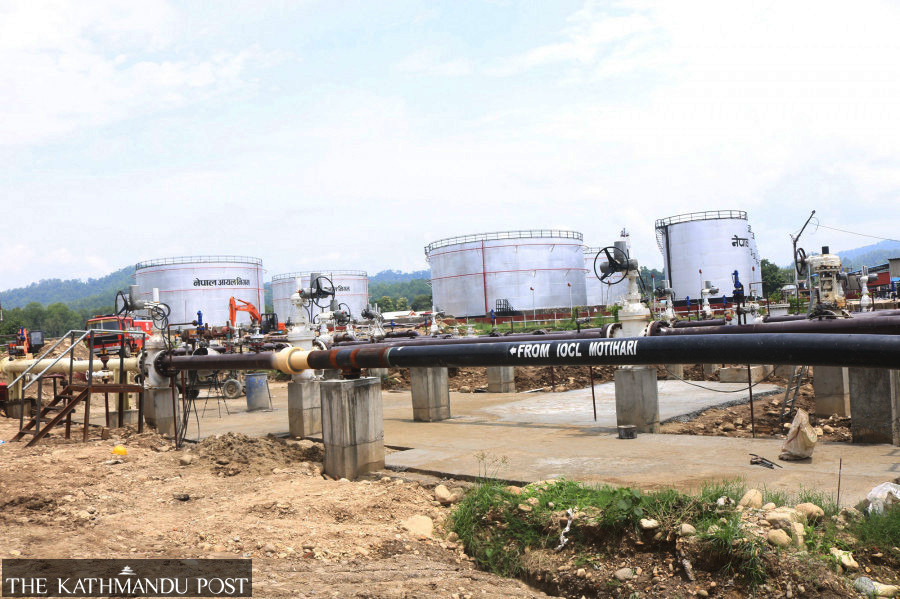Money
Pipeline plan slammed for violating eco commitments
Experts say there is an immediate need to decarbonise the transport sector, not import more gasoline.
Krishana Prasain
The construction of an oil pipeline has been listed among the key agreements that will be signed during Prime Minister Pushpa Kamal Dahal's visit to India next week, raising cries of double standards from experts and civil society leaders.
They say the pipeline project contradicts Nepal’s commitment made at different national and international forums to go for clean energy.
“Listen Prime Minister! Agreeing to build a petroleum pipeline from India to Nepal is treason! We do not want it! We do not need it. It makes no economic sense! It goes against GoN’s own NDCs & climate commitments! We need to free Nepal from fossil fuel and air pollution!” Arnico Pandey, central committee member of the Rastriya Swatantra Party, wrote on Twitter.
“Stop any agreement on the construction of diesel pipeline reportedly ready to be signed during our PM’s visit. The idea may serve India’s interest, we in Nepal see no economic or social benefit for our people. It hurts us to see it being done in the name of friendship,” former finance minister Devendra Raj Pandey tweeted.
Krishna Gyawali, former government secretary, also tweeted, “Yes, it goes against Nepal’s commitment made during #COP26 in #Glasgow to achieve #NetZeroCarbon targets by 2045, reflected in our own #NDCs submitted for cabinet approval by MoFE Nepal. Stop this deal, Hon. Prime Minister! Focus instead on clean energy trade and airspace permits.”
Officials at the Industry, Commerce and Supplies Ministry are tight-lipped.
“I do not have authorised information regarding the petroleum pipeline agreement being signed during the prime minister’s visit to India,” said Radhika Aryal, joint secretary at the Industry Ministry.
Madhu Kumar Marasini, secretary of the Industry, Commerce and Supplies Ministry, did not respond to the Post's questions.
Insiders say a pact will be signed on building a pipeline from Siliguri in West Bengal, India to Charali, Jhapa and storage facilities besides extending the existing Motihari-Amlekhgunj pipeline to Lothar, Chitwan.
An agreement will also be signed on further extension of the Indian-funded oil pipeline inside Nepali territory.
Experts say these billion-dollar projects are a waste of money. According to them, there is an immediate need to decarbonise the transport sector, and most countries, including Nepal’s two immediate neighbours, are already moving in that direction.
“India is looking to expand its fuel market, but it is a loss for Nepal if it plans to build the pipelines. The government needs to think about these issues seriously,” energy expert Amrit Nakarmi told the Post in a recent interview.
In Nepal, nearly everyone is confused about its energy policy. For example, one group of experts are arguing whether to build an oil pipeline or to promote electric vehicles. Another group is discussing the pros and cons of laying a gas pipeline and making greater use of surplus electricity.
Environment groups have been lobbying the government to build charging stations for electric vehicles across the country. But the bureaucracy and the oil utility want to build a multi-billion-rupee pipeline to transport liquefied petroleum gas.
Nepal made a commitment to net-zero carbon emission by 2045 at the United Nations Framework Convention on Climate Change (COP26) in Glasgow in November 2021.
The government has targeted the usage of electric vehicles reaching 25 percent in 2025 and 90 percent in 2030. But the policies keep on changing.
The government is also planning to increase the tax on electric vehicles (EVs) in the coming budget for the fiscal year 2023-24, experts said at a recent EV Dialogue event organised by the Kantipur Media Group.
Full dependency is bad, experts say. In 2015, a fuel crisis created by India's unofficial blockade launched a discourse on Nepal’s energy security.
As Nepal is completely dependent on India for petroleum products, a halt to fuel shipments led to an acute shortage, forcing the government to ration fossil fuels, implement an odd-even system for vehicular movement, and stop selling gasoline for private automobiles altogether for months.
In 1989, India, which surrounds Nepal on the east, west and south, imposed an embargo against its small neighbour for a year and a half. Being a landlocked country, Nepal’s options are limited with regard to its fuel needs and has a hard time when its sole supplier turns off the supply.
Petroleum products are Nepal’s largest import. According to the Department of Customs, Nepal’s fuel import jumped by 90 percent in the last fiscal year to Rs334.34 billion from the previous fiscal year 2020-21.




 18.12°C Kathmandu
18.12°C Kathmandu













